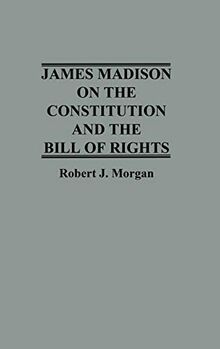
Morgan provides a comprehensive, consistent, and unified analysis of Madison's political philosophy using Madison's views on the Constitution and the Bill of Rights as the focus. Morgan looks at all that Madison wrote on these topics before, during, and after the adoption of the Constitution. He argues that Madison's constitutional philosophy was shaped by his view that there was an inherent conflict between limited government and accountability on the one hand, and the tendency of all to exercise autonomous, unrestricted power...His second thesis is that Madison was propelled to become a constitutional reformer not by any desire to curb democracy but by the need to preserve both the union and republican government. Morgan emphasizes the impact of the American experience in shaping Madison's thought as well as its eclectic character. Choice James Madison stands out among the founding fathers of the U.S. government because of his analytical and creative political insight into the framing and explaining of the Constitution and the Bill of Rights.
Madison became a constitutional reformer in order to preserve a republican government strong enough to fulfill what he felt was the destiny of the United States. This volume casts further light on Madison's beliefs through a comprehensive examination of his writing. This is not a simple task: there are substantial difficulties involved in developing a comprehensive consistent, and unified analysis of Madison's political thought. Madison's writings were extensive, and must be carefully perused in order to separate the rhetoric of his public exposition from the essence of his private thought. Furthermore, Madison never denied his aim of justifying and explaining the Constitution by sacrificing pure theory to the requirements of the prevailing political situation. Nonetheless, author Morgan has used the simplest possible interpretations of Madison's writings to reveal a clear and overriding thesis that gives unity and focus to his thought. This focus relates to the continuing tensions between the democratic idea of accountability and the tendency of all governments to seek autonomy, especially in the conduct of foreign relations.